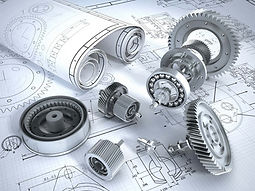Revolutionizing Manufacturing Engineering with AI and InnovAira Global's Expertise
- nithinzone
- Aug 30
- 3 min read
The world of manufacturing is changing fast. Technology is driving this change, and Artificial Intelligence (AI) is at the forefront. It is not just another tool; it is transforming how manufacturers operate every day. This post explores the critical role AI plays in manufacturing engineering and how InnovAira Global can help you enhance your operations and outcomes.

The Rise of AI in Manufacturing
AI is becoming a core element in the manufacturing landscape. It allows companies to refine operations, cut costs, and boost product quality. For example, manufacturers using AI can save up to 20% on operational costs through better resource allocation and waste reduction. By harnessing machine learning and data analysis, businesses can uncover insights that were hard to find before. These insights lead to greater efficiency and innovation.
AI technologies like predictive maintenance, quality control, and supply chain optimization are not just trends — they are essential for modern manufacturing. They empower engineers to predict equipment failures, maintain consistent product quality, and streamline logistics processes. The result? A more agile and responsive manufacturing environment.
Benefits of AI in Manufacturing Engineering
Enhanced Efficiency
AI significantly improves operational efficiency. AI systems can digest large volumes of data in real-time, identifying trends and issues that may go unnoticed by humans. This speed allows for quicker decision-making and better resource management.

For example, a manufacturer could employ AI to optimize production schedules by analyzing historical demand data. This can result in a 15% increase in output capacity, ensuring resources are used wisely and customer demands are met without delay.
Improved Quality Control
Quality control is vital in manufacturing. AI-driven systems use tools like computer vision and machine learning to spot defects in products. By adopting these technologies, manufacturers can assure that only goods meeting high-quality standards go to market.
For instance, one company saw a 30% reduction in defects after implementing AI for quality checks. These systems continuously adapt to new data, allowing for consistent updates in the quality control process, reducing the workload associated with returns and rework.
Predictive Maintenance
AI excels in predictive maintenance, a critical area for manufacturers. Traditional maintenance schedules often adhere to fixed time intervals, leading to unexpected equipment breakdowns or excess downtime. AI uses data from sensors and historical trends to predict when a machine might fail.
A proactive approach can cut maintenance costs by 25% and reduce machine downtime by approximately 50%. This not only enhances productivity but also creates a safer work environment for employees.
InnovAira Global: Your Partner in AI-Driven Manufacturing
Expertise in AI Integration
InnovAira Global specializes in embedding AI solutions into manufacturing processes. Their talented team of engineers and data scientists understands manufacturers' unique challenges and offers personalized solutions.
By teaming up with InnovAira, companies tap into leading-edge AI technologies that boost their manufacturing capabilities. Whether it's implementing predictive maintenance systems or refining production workflows, InnovAira Global provides the know-how to tackle the complexities of AI integration.
Customized Solutions for Diverse Needs
No two manufacturing operations are the same, and InnovAira Global knows this well. The company offers tailored AI solutions that align with distinct business goals and operational requirements. This customization ensures that manufacturers reap the maximum rewards from AI without disrupting their existing processes.
With a focus on each client's specific needs, InnovAira Global develops solutions that deliver real results. By emphasizing the unique elements of each operation, they assist manufacturers in meeting their objectives more effectively.
Continuous Support and Training
Implementing AI solutions is only the first step. InnovAira Global commits to ongoing support and training, helping manufacturers make the most of their new technologies. This focus on continuous improvement positions organizations to remain competitive.
InnovAira offers training programs and resources that empower engineering teams to leverage AI effectively. This investment in workforce development not only boosts skills but also nurtures an innovation-oriented culture within the organization.
The Future of Manufacturing Engineering with AI
As AI technology continues to advance, its influence on manufacturing engineering will expand. The integration of AI will lead to smarter factories, where machines and systems communicate seamlessly for optimal production. This future will promise higher efficiency, lower costs, and improved product quality.
Manufacturers embracing AI will find themselves better equipped to respond to shifting market demands and technology changes. Partnering with InnovAira Global can ensure that companies are at the leading edge of this evolution, utilizing AI to drive innovation and achieve success.
Final Thoughts
AI's transformative impact on manufacturing engineering is profound. From boosting efficiency and elevating quality control to enabling predictive maintenance, AI is reshaping the industry landscape. Collaborating with InnovAira Global enables manufacturers to harness AI’s power, optimizing operations and reaching business goals.
As manufacturing continues to progress, staying ahead is critical for success. With InnovAira Global's expertise and customized solutions, businesses can confidently navigate AI integration complexities and thrive in the future of manufacturing.
Do you think AI reduce Human Creativity ?
Yes
No
I don't know


Comments